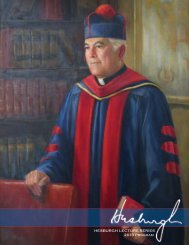HESBURGH LECTURE SERIES 2012 Program - Alumni Association ...
HESBURGH LECTURE SERIES 2012 Program - Alumni Association ...
HESBURGH LECTURE SERIES 2012 Program - Alumni Association ...
You also want an ePaper? Increase the reach of your titles
YUMPU automatically turns print PDFs into web optimized ePapers that Google loves.
Jeffrey H. Bergstrand, Ph.D.<br />
Professor, Finance; Fellow, Kellogg Institute for International Studies<br />
Biography<br />
Jeffrey Bergstrand is a professor in the Department of Finance and a faculty fellow of the<br />
Kellogg Institute for International Studies at Notre Dame. He joined the faculty in 1986<br />
and teaches macroeconomics in the M.B.A., executive M.B.A., and executive development<br />
programs in the Mendoza College of Business. Bergstrand received his B.A. in economics and<br />
political science from Northwestern University in 1974. He earned his Ph.D. in economics<br />
from the University of Wisconsin-Madison in 1981 with concentrations in international and Categories<br />
macroeconomics. Bergstrand worked as an economist at the Federal Reserve Bank of Boston<br />
Business, Government<br />
from 1981 to 1986, conducting research and providing policy advice on international and<br />
macroeconomic issues. He has authored papers on structural determinants of real exchange<br />
rates, determinants of international trade flows, and trade policies, measurement and<br />
determinants of foreign direct investment, and international currency substitution for the American Economic Review, Economic<br />
Journal, Review of Economics and Statistics, Journal of International Money and Finance, Journal of International Economics, and<br />
other professional economics journals and books. He is on the board of editors of the Review of International Economics.<br />
Lecture<br />
Understanding Globalization: Past, Present, and Future<br />
The post World War II era has seen a dramatic increase in economic globalization – that is, increased international trade, foreign<br />
direct investment, and migration. This lecture examines the degree and sources of this past increased globalization – both<br />
in terms of reductions in “natural” barriers (such as shipping and information costs) as well as in “man-made” barriers (such<br />
as tariffs on imports and exports and government barriers to foreign direct investment). It examines the present “degree” of<br />
globalization: Is the world (economy) “flat”? This lecture also addresses the likely evolution of the world economy over the next<br />
few decades.<br />
14 The Hesburgh Lecture Series, <strong>2012</strong> <strong>Program</strong>



